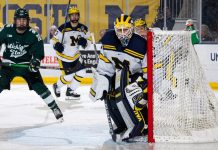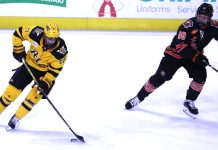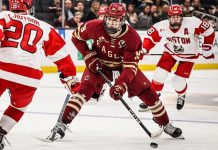
No. 1 UMass Lowell hosts No. 10 New Hampshire
Why Lowell will advance: The River Hawks have played so well all season, a four-game dip notwithstanding, that it’s hard to see them not moving on to the Garden. They’ve won seven straight, just like they did before the aforementioned dip, and that includes two wins over Boston College, one over Boston University and yes, an 8-2 win over UNH. By contrast, UNH had gone 1-10-1 before defeating Merrimack twice to set up this matchup.The River Hawks also have the league’s second-best offense (3.62 goals per game) and power play (27.9 percent), the latter of which could be deadly against UNH’s 10th-best penalty kill (79.9 percent).Why UNH will advance: Lowell could be rusty, and it’s almost impossible to stop the line of Tyler Kelleher, Michael McNicholas and Jason Salvaggio, who have combined for 59 goals and 141 points.A closer look: If UNH is going to win, the Kelleher line is going to have to produce in a big way.”Tyler has had a great season,” UNH coach Dick Umile says. “He’s helped make other players better. When he’s on the ice, he’s a threat, whether he scores or finds someone.”But we’ll need other people to contribute.”Don’t expect the River Hawks to change what’s made them successful just to stop the big line.”We haven’t spent a whole bunch of time talking about the individual players on their team,” UML coach Norm Bazin says. “They do have the top scoring forward in the country in Kelleher, we realize that, but we have played a whole host of teams here to lead up to this series that have had top scorers in the country with Northeastern, BU and BC. So I can’t say we’ll spend a whole bunch of time on that. We’ll focus on being good every single shift whether Kelleher is on the ice or not.”As for special teams, which often come to the fore at playoff time, that will be a focus, especially the aforementioned matchup between the Lowell power play and the UNH penalty kill. In Lowell’s 8-2 win a few weeks back, it went 3-for-5 on the man advantage, a scenario that will be a death knell for UNH’s season if it’s repeated.”It’s going to be a challenge,” Umile says. “When we played them a couple weeks ago, they moved the puck extremely well. They can really shoot it from the point, and the puck moves, down low and out at the top. The best thing is to stay out of the penalty box.”As the league’s least-penalized team, the Wildcats may have a shot at doing that, as will Lowell, the third-least penalized team.”I think both teams have a strong power play and strong penalty kill, so special teams could play huge in this series,” Bazin says. “Both teams are very disciplined, [so] I don’t expect a whole bunch of penalties. At the same time, special teams are magnified come playoff time. We feel we have to get our power play at its best in order to be effective against a good penalty kill.”
No. 2 Boston University hosts No. 8 Northeastern
Why BU will advance: Clearly superior team defense, penalty killing and goaltending.Why Northeastern will advance: The league’s top offense (3.78 goals per game) and power play (28.9 percent), and the experience advantage after winning the title last year.A closer look: BU finished the year as one of the top three defensive clubs in Hockey East while Northeastern came in ninth. Perhaps more significantly, BU goaltender Jake Oettinger ranked tops in the league in both save percentage (9.27) and goals against average (2.07) compared to Northeastern’s Ryan Ruck (.896, 14th, and 2.94, 12th, respectively).That superiority in the defensive end is what projects to win the day against Northeastern’s top offense, led by Zach Aston-Reese, Dylan Sikura and Adam Gaudette, who finished as three of the league’s top scorers.”I look at BU and am aware of their defensive prowess and their accomplishments, but when I look at that lineup I see an awful lot of offense, too,” NU coach Jim Madigan says. “It’s hard not to think they’re not an offensive team, too. But I’d like to think we play well defensively, even though our numbers don’t show it.”We know we’re not going to get four and five goals against BU, so we’re going to have to be smarter and more opportunistic around the net.”As for that potent power play, Madigan hopes it gets a chance to show its might.”I hope we’re getting the calls the way they’ve been called all season long,” he says. “There’s a tendency in the playoffs to pull back a little bit. But if we can get four or five opportunities, then I feel good about our ability to cash in.”BU coach David Quinn feels his team’s recent play bodes well for the playoffs.”We’ve done a much better job over the last few weeks of playing a smarter brand of hockey,” he says. “We don’t want to play safe hockey, but we want to play smart hockey. At times, we can get a little too loose and be our own worst enemy, but we did a much better job of that over our last two weekends.”He sees two keys to holding the Huskies’ power play in check.”No. 1, we’ve got to stay out of the box,” Quinn says. “They’re lethal on the power play. Forty percent of their goals (56 of 136) have come on the power play. If you lose the penalty game against them, your chances aren’t great at beating them.”We’ve done a better job of staying out of the box lately. So that’s No. 1.”No. 2 is you’ve got to be physical, but you can’t be stupid about it. You’re not going to run around looking for big hits, because when that happens they’ll exploit you. You’ve just got to be hard around the puck and win the subtle one-on-one battles.”One possibly hidden advantage for Northeastern is its experience, having won the Hockey East title last year, compared to a very young BU club.”We see it,” Madigan says. “There’s a confidence. There’s a calmness. I like the words and messaging coming from the leaders in the locker room. It keeps everyone in neutral and balanced.”
No. 3 Boston College hosts No. 6 Vermont
Why BC will advance: Even though BC is the higher seed, it’s tough to find an edge for the Eagles beyond the home-ice advantage. There is an institutional strength in playoff experience that centers on coach Jerry York, but how well will that translate to such a young club? Perhaps it’s just the edge the Eagles need, but it’s anyone’s guess.The two teams played to a pair of ties at BC a few weekends back, so this result could come down to the bounces of the puck.The wild card is the familiarity that comes from these two schools having met in the quarterfinals the last three seasons and four of the last five.Why UVM will advance: The Catamounts played reasonably down the stretch and outscored Maine in the opening round by a collective score of 10-1, while BC hasn’t won since Feb. 3, going 0-5-2 to lose the top seed and outright ownership of the regular season title.The Catamounts also own the advantage on the power play, where they finished fourth (19.3) to BC’s 11th (14.4).A closer look: Arguably, no team needed a first-round bye more than the Eagles. That ugly finish, which players could easily equate with frittering away the regular season championship, begged for a mental reset.”For sure,” York says. “Mentally for young kids, it’s a hard struggle to get through Hockey East.”Vermont coach Kevin Sneddon concurs.”The bye probably helped them regroup and make some adjustments,” he says. “They only had to worry about themselves, not look too far ahead, and reflect internally and work on things they wanted to improve upon. So we’re expecting to see Boston College at its best, confident and ready for the second season.”Of course, that’s 180 degrees away from where Sneddon’s attention lies.”We’re just worried about our team playing to the best of our abilities,” he says. “All we’re focused on right now is our team playing to our identity from that first shift on Friday night.”As for BC’s struggling power play, it’s definitely been a point of emphasis for York and his Eagles.”A lot of the teams that advanced last week were successful on the power play,” he says. “Goals get harder and harder as the season progresses, especially in the playoffs.”We’re trying to stress quicker decisions on the power play and more shots on goal. Basic stuff that other teams try to prevent you from doing. Any good power play has to be able to move the puck quickly and get shots through traffic, whether it’s one-timing it or a little hesitation move to get pucks to the net.”We have not been particularly good in those areas, so we’re stressing it and trying to get better there.”It comes down to the basics.”You have to screen goaltenders now because they’re so good,” York says. “Your shots have to be on net. Most likely, you’re going to score on rebounds, so you need people in place to get those rebounds.”It’s basic stuff, but we’ve got to execute it.”That’s the area we’ve got to make strides in: power play and five-on-five goals.”
No. 4 Notre Dame hosts No. 5 Providence
Why Notre Dame will advance: Home ice and goaltender Cal Petersen. Beyond that, it’s a toss-up with a hair’s breadth of difference between the two teams (even though three weeks ago the Irish took three of four points in their series).Why Providence will advance: In a 4-vs.-5 match, either team could easily win. And the Friars have been hotter for longer; arguably no team has more momentum and sustained excellence.A closer look: Both teams finished the season with strong stretch drives. Notre Dame carried a seven-game undefeated streak into its finale with BU, a contest that would have given the Irish the regular season title outright if they had won. (Yeah, yeah, other than that, Mrs. Lincoln, how’d you like the play?) While they couldn’t pull off that feat, the fact remains that the Irish finished strong.Not as strong, however, as Providence. The Friars lost only a single game after Friday the 13th (for you superstitious types) in January, going 13-1-1 in that stretch. Of course, the only two blemishes in that stretch came against You Know Who (again, see Mrs. Lincoln).So if there’s any edge in momentum, it goes to Providence.”Our team chemistry has really come together,” PC coach Nate Leaman says. “There has been a lot of growth within our team over the course of the season. Our success [going into and coming out of the break] showed us if we stick to what we do and how we play, we can have success.”Since this series pits the top two overall defenses against each other, one would expect low-scoring games. Leaman, however, isn’t so sure.”I wouldn’t say that our series two weeks ago out there was a lockdown whatsoever,” he says. “What makes Notre Dame a good defensive team is that they possess the puck a large part of the game, and I feel our team can do that very well also. When you look at the defensive numbers of the teams, a large part of that is the puck possession.”Notre Dame coach Jeff Jackson echoes that assessment.”Both teams play a real sound defensive game,” he says. “I believe the biggest part of defense is puck management. If you’re doing a good job of possessing the puck, it helps your team defense a lot. The focus for us has to be to manage the puck out of our zone and through the neutral zone.”Providence is very tough to break out on or come through the neutral zone on, so we have to do a real diligent job of having good puck support and making good puck decisions.”Most statistical measures point to this matchup ending up in a dead heat. The top two defenses. Two of the weakest power plays. Tiny differences elsewhere.Arguably, the biggest difference comes in the form of Irish goaltender Petersen. While the Friars’ Hayden Hawkey came on strong, Petersen has excelled for more than two years. That experience factor could tip the scales in Notre Dame’s favor.”This time of the year, generally it all boils down to goaltending and, in many cases, special teams,” Jackson says. “The games are generally so close that having a goaltender you can count on is a huge part of winning.”Cal has played that way for us the past two and a half years. I couldn’t think of anybody I’d rather have in net than Cal.”He’s very sound and square to the puck and does a good job of controlling rebounds. He’s made improvements in his mental approach and has the ability to make that great save when he needs to at a key time in the game.”Having the bye last week also helps.”Fortunately,” Jackson says, “he’s gotten rest over the last two weeks, so he’s back at 100 percent capacity and won’t have fatigue wearing at him.”
A free college hockey story (one last reminder)
If you’ve signed up for my fiction newsletter, perhaps based on my promise of a free college hockey story in a recent column, you got that newsletter and download instructions on Feb. 14, or if you signed up later than that, March 7. I hope you liked the story.(If you didn’t get the newsletter, check your Spam folder or if you use Gmail, the “Promotions” tab. If you’re still stuck, let me know at dave.hendrickson@gmail.com and I’ll fix it somehow.)If you haven’t signed up yet, it isn’t too late to get the free story in which all the action takes place at a college hockey tournament. Just sign up for my newsletter on my website. You won’t get peppered with spam, and if you don’t like it, you can always unsubscribe. I’ll never share your email and will likely send out a newsletter only four or five times a year. (Last year, there were only two.)A few easy clicks and you’ll be able to read the story on virtually any e-book reader or tablet out there, or on your smartphone, or on your computer.
A special note of thanks
Since this is my last column before we switch to NCAA tournament previews — Jim finishes the columns off next week — I should note my thanks in many areas.Thanks to all you readers because without you it all would be pointless. Thanks to the coaches, players, and administrators for their time and insights. Thanks to the sports information directors (and those who fill that function while working under other titles) for their tireless work and support.Thanks to Jim, whose patience during some of my scheduling difficulties went far beyond the call of duty. Thanks to my editor, Matt Mackinder, and all the rest of the behind-the-scenes staff here at USCHO.And most of all, thanks to my wife, Brenda, for her love and amazing support, especially her transcriptions of interviews, without which I couldn’t get these columns written.


